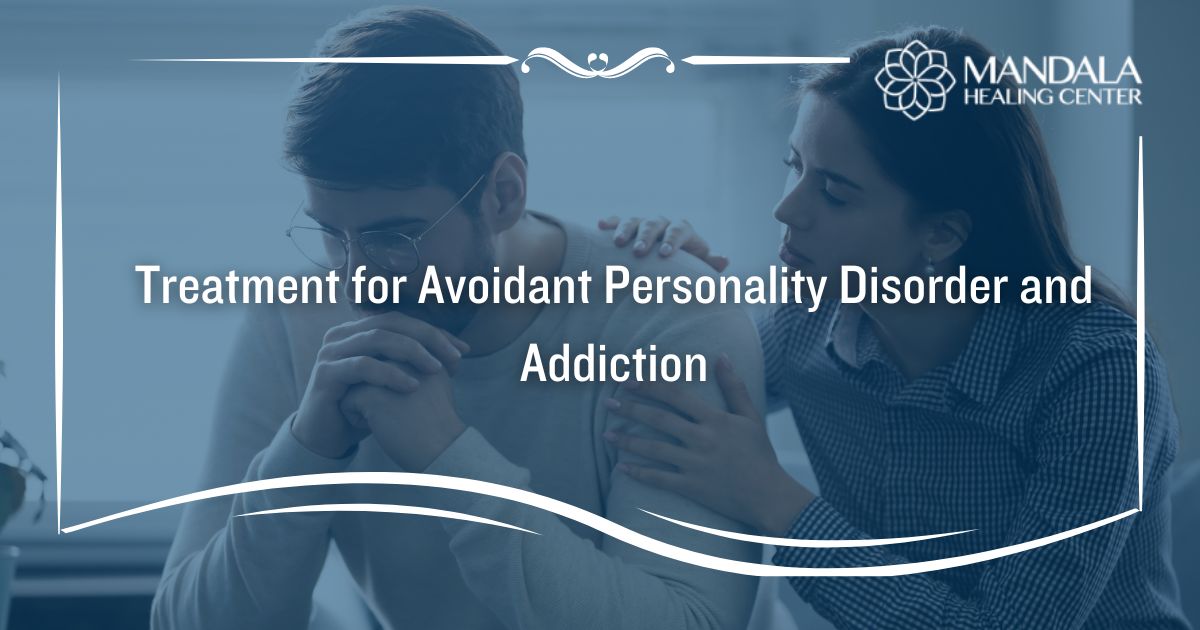Co-occurring disorder is a term that describes someone experiencing a mental health condition at the same time as addiction. According to the Substance Abuse and Mental Health Services Administration (SAMHSA), 21.5 million adults struggled with co-occurring disorders in 2022.[1]
Any mental illness can co-occur with addiction. That said, personality disorders often cause people to abuse substances as a form of self-medication. For example, while personality disorders occur between 10 to 14.8% of the general population, 34.8% to 73.0% of people treated for addiction also have one.[2]
One of the personality disorders that co-occurs with substance abuse is avoidant personality disorder (AVPD). People with avoidant personality disorder experience chronic feelings of inadequacy, extreme sensitivity to criticism, and avoid social situations out of an intense fear of rejection. If you have AVPD, you might begin abusing substances to increase your social skills and ability to communicate with others.
If you have co-occurring AVPD and addiction, you need to receive treatment for both conditions at once. Dual-diagnosis treatment centers offer a two-pronged approach to recovery that includes traditional addiction treatment methods and evidence-based mental health techniques.
In this article, you will learn:
- What is avoidant personality disorder
- How does avoidant personality disorder and substance abuse relate
- How will a treatment center help you overcome co-occurring AVPD and substance use disorder
What is Avoidant Personality Disorder (AVPD)?
Avoidant personality disorder (AVPD) is a mental health condition that belongs to Cluster C of personality disorders. This is a group of personality disorders that is characterized by fear and anxiety. It also includes conditions like dependent personality disorder and obsessive-compulsive personality disorder.
AVPD causes people to fear criticism or rejection. While individuals with this condition crave connection, they avoid social interactions out of fear. You might be reluctant to take personal risks if you have this condition.
The common symptoms of avoidant personality disorder include:[3]
- A strong fear of rejection that causes you to choose isolation over social settings
- Having a poor self-image
- Being overly concerned about criticism or disapproval
- Reluctance to engage with others unless you are confident you are liked
- Dealing with extreme anxiety in social situations
- Avoiding activities or jobs that involve social interaction
- Being shy in social settings out of fear of being embarrassed
- Exaggerating potential problems or misinterpreting feedback as an attack
- Fear of trying new things or taking chances
How are AVPD and Addiction Connected?
Avoidant personality disorder involves an intense fear of rejection. If you have this condition, you might be incredibly anxious about socializing with others. However, you have strong cravings for connection with other people.
Because you want to connect with others but experience intense fear, you might begin abusing substances to improve your social skills. For example, AVPD is highly connected with alcohol abuse. Alcohol can lower your inhibitions and make socializing easier.
Over time, you will develop a dependency and addiction to the drug you are using. Instead of choosing a healthy coping mechanism, you are self-medicating with substances. This means you will suffer from addiction and worsen your AVPD over time.
How are Substance Use Disorder and AVPD Treated?
Substance abuse and AVPD must be treated at the same time. Thankfully, dual-diagnosis rehab programs are equipped to do so. These programs offer a combination of mental health and addiction recovery services.
During treatment for AVPD and addiction, you will engage in a variety of treatments. First, you will participate in addiction recovery techniques. Once you are ready to tackle your AVPD, you will engage in therapy.
Dual diagnosis rehab for AVPD and substance abuse involves:
Addressing Addiction
The first step in overcoming addiction is medical detox. You will be given medications to manage your withdrawal symptoms. Doctors will also monitor your vital signs to keep you stable.
After detox, you will engage in behavioral therapy. Therapy helps you recover from addiction by addressing the root causes of your substance abuse. Additionally, you will learn vital coping mechanisms to prevent relapses.
Examples of therapies used to treat addiction include:[4]
- Cognitive behavioral therapy (CBT)
- Motivational interviewing (MI)
- Contingency management (CM)
- 12-step facilitation therapy
- The matrix model
- Family behavior therapy
Treating Avoidant Personality Disorder
The first step in treating AVPD is diagnosis. You will engage in an in-depth assessment to ensure AVPD is the right diagnosis. Once you are diagnosed, it is easier to draft a treatment plan.
AVPD is treated using therapy. Usually, talk therapy is used to help you identify negative patterns of thinking. Your therapist will teach you how to begin positive patterns of thought and behavior.
Therapy will help you lessen your fear surrounding socializing. You will also participate in group counseling. Group therapy helps you connect with others and develop social skills.
Unfortunately, there is no medication to treat AVPD. That said, anti-anxiety meds can be used to control symptoms. Eventually, therapy will lessen your need for these medications.
Find Help for Avoidant Personality Disorder and Addiction
Suffering from AVPD and addiction is never easy. Thankfully, the Mandala Healing Center is here to help. We offer a comprehensive dual-diagnosis treatment program to help you recover.
Contact us today for more information on how to get started.
References:
- The Substance Abuse and Mental Health Services Administration (SAMHSA): Co-Occurring Disorders and Other Health Conditions
- Research Gate: Comorbidity of Personality Disorder among Substance Use Disorder Patients: A Narrative Review
- Merck Manuals: Avoidant Personality Disorder
- Science Direct: Evidence-based practices for substance use disorders












